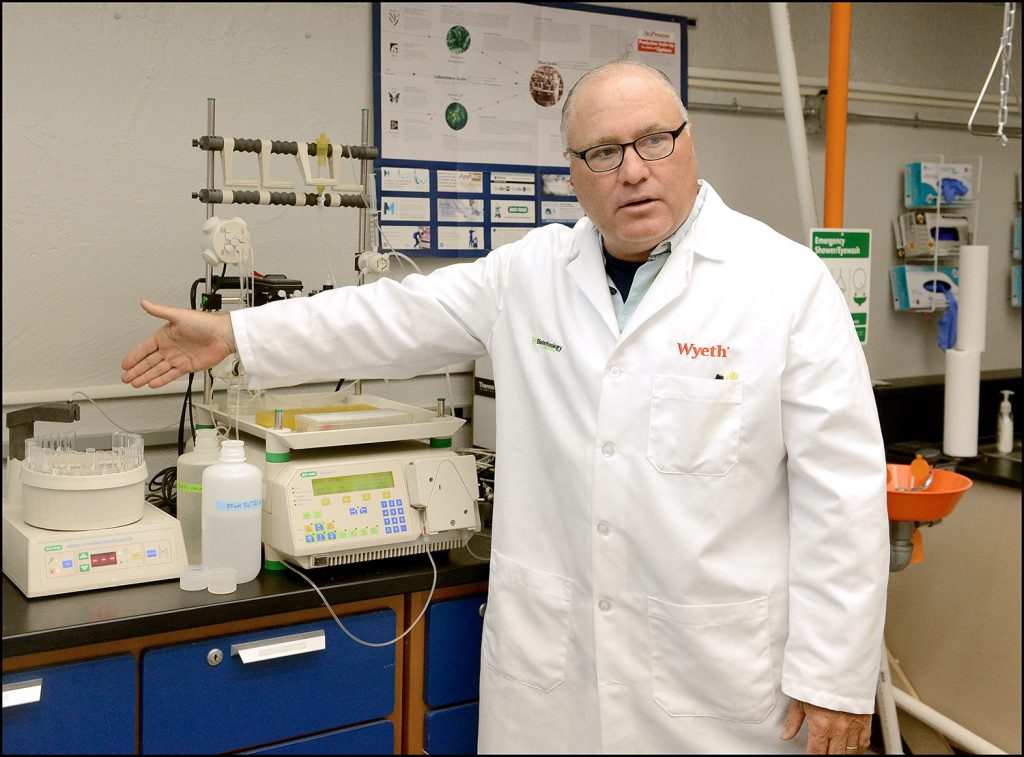Finger Lakes Community College will receive $1.14 million in National Science Foundation funding to take part in a national effort to strengthen biotechnology education and encourage more youth to pursue careers in the field.
FLCC is the home base for the Community College Undergraduate Research Initiative (CCURI), which promotes the teaching of science through research. The National Science Foundation has previously awarded FLCC $5.8 million to develop and share its approach with community colleges across the country.

In this recent award, the National Science Foundation has granted $7.5 million to Austin Community College in Texas to lead the project. ACC will create the InnovATEBIO National Biotechnology Education Center to consolidate several biotech education projects into a national network. This network will share best practices and expand undergraduate research in biotechnology.
As a collaborator in the project, FLCC will provide training in the use of research to teach biotechnology concepts and skills.
“This latest grant is a testament to FLCC’s role as a national leader in the expansion of research opportunities for undergraduate students,” said FLCC President Robert Nye. “I congratulate our faculty and staff, led by Professor James Hewlett.”
CCURI supports Objective 4 by providing opportunities for applied learning in scientific research.
Hewlett, a Webster resident, launched CCURI more than a decade ago to change how science is taught at community colleges. He wanted to replace “cookbook” lab exercises with opportunities for students to conduct real-world research.
Studies have shown that students find research more engaging than pre-planned exercises. Students who have participated in research are also more likely to stick with science in college and pursue careers in science.
“If we’re teaching students to become scientists, we need to let them be scientists right from the start,” Hewlett said.
FLCC student Abigail Giddings of Walworth took part in research for the first time in spring 2019. She extracted DNA of freshwater sponges gathered across the northeastern U.S. to contribute to a database showing where each species was found. She feels a thrill in knowing other scientists could someday study pollution and climate change by looking for patterns in sponge distribution that she helped establish.
“It made everything I had already learned about biology come to life,” Giddings said, adding that she found herself engrossed in the project. “I lost hours in the lab and I’d look up and realize it was 10 minutes past when I was supposed to leave.”
Giddings plans to continue on to medical school and no longer finds the prospect of further research intimidating. “It’s definitely more challenging than a lecture course,” she said of research, “but I learned so much more at a deeper level.”
FLCC started its research initiative in cooperation with three other New York community colleges and one in Delaware in 2006. At that time about 3 percent of students who transferred from those five schools and earned a four-year degree in science later applied to a graduate program in STEM (science, technology, engineering and math). In just a half-dozen years, the number rose to 13 percent.
Hewlett’s pilot project led to a $3.3 million NSF grant in 2011 to take his concepts and practices on the road to other colleges. Since then, CCURI has grown to a network of 42 institutions that provide 6,000 students per year with research experiences.
While CCURI promotes all types of scientific research, the collaboration with InnoVATEBIO will focus on biotechnology with an emphasis on improving the connections between high school and community college biotechnology programs. It will involve the study of industry trends and input from leaders in the field to develop and share best practices in biotechnology workforce development.
Forsyth Technical College in North Carolina and Madison Area Technical College in Wisconsin are also partners in this national project.
Hewlett and Heather Bock, a 2006 FLCC graduate now working as CCURI project director, will conduct workshops and help faculty at other community colleges develop research projects. This entails finding meaningful projects that will help students understand scientific principles, figuring out how to conduct the research within scheduled lab times, identifying the equipment and supply needs, and developing curriculum for project implementation.
For Giddings, research allowed her to develop the following academic skills: analysis of scientific papers, experimental design, DNA sequencing analysis, basic laboratory skills such as pipetting and electrophoresis (separation of charged molecules), data management, and how to present a scientific poster.
Beyond scientific skills, research incorporates many of the soft skills that employers look for in all fields: the ability to solve problems and communicate.
“I do think the research experience does deliver on multiple levels,” Hewlett said. “Research is inherently full of moments of failure which gives plenty of opportunity to leverage those results into opportunities to think critically and solve problems – skills highly valued by employers.”
For more information about CCURI, visit curri.org. For information about FLCC programs, visit flcc.edu.

